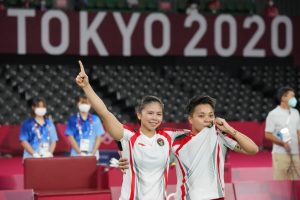At the recently completed Tokyo Olympics, Indonesia celebrated the historic gold medal victory of its double-paired badminton players, Greysia Polli and Apriani Rahayu. Polli and Rahayu were the first Indonesian women doubles team to secure gold for Indonesia in that event, a victory that has brought a welcome respite for a nation currently suffering under a devastating COVID-19 outbreak.
Indonesians should be grateful for this remarkable achievement and appreciate the efforts of the athletes who have worked so hard to bring home medals from the Olympics. However, considering Indonesia’s demographic advantages as a young, populous country, and the potential of its population, its participation at the Olympics, and the country’s sports development in general, must be carefully assessed.
There is no direct relationship between population and Olympics achievements. In the current Tokyo Olympic tally, the United States and China may have dominated the gold medals, but some countries with much smaller populations, including Australia, Germany, and the Netherlands , sit in the top 10.
At the 2020 Tokyo Olympics, Indonesia sent just 28 athletes to compete in eight different events. Indonesia’s Minister for Youth and Sports and the Indonesian Olympic Committee set a target of 40th place on the final medal tally. However, after the Games came to an end last week, Indonesia had finished in 55th place, well short of the government’s target.
In Tokyo, Indonesia only brought home gold medals in badminton, while events like weightlifting yielded silver and bronze medals. The country has historically had a sort of dependence on these sports. It is not wrong to say that Indonesia is craving greater achievements at the Olympics. The athletes have all given their best. Yet after falling short of its target, the Indonesian government must launch a comprehensive review of the country’s performance at the Games.
There are four main reasons for Indonesia’s lackluster sporting achievements in recent years. First, the most common way of evaluating the political commitment to sports is to look at its budget allocation. In the 2021 National Budget, the Ministry for Youth and Sports has been allocated just 2.3 trillion rupiah (around $160 million), a paltry 0.08 percent of the total budget. With that tiny budget, the office faces significant limitation in developing national sports management. Even though this specific number may reflect budget reallocations due to the COVID-19 pandemic, it suggests that the lack of financial support has contributed to Indonesia’s underwhelming sporting achievements.
Second, a recent study shows that Indonesia’s management system of sports development is challenged by the country’s limited infrastructure and training facilities, its limited ability to applying science and technology and health science in its sports programs, the lack of integration of educational sports in school settings, and – most importantly – its lack of efforts in cultivating sports as part of Indonesian culture. In recent years, there have been some improvements, as more people are biking and running on the streets. However, most of this has taken place in the big cities. The ministry understands this problem, allocating half of its 2021 budget to improve the quality of sporting facilities. Yet the main problem for all facilities is maintenance, something to which Indonesia has usually paid scant attention.
Third, it is typical to see Indonesia’s various sporting associations filled with politicians. This political leadership may have the power to navigate the bureaucracy and secure more resources to support sports development. However, it would be more appropriate to appoint the right person to lead sporting associations, on criteria of merit and competence. Given that politicians’ power tends to decline and shift, this contributes to the lack of sustainability in Indonesian sports development. Joko Irianto, the chief of the Indonesian Sports Scientist Association, once stated that it is very harmful to use sports association as a political instrument to gain popularity.
Fourth, there is the issue of massive corruption in sport. Indonesians were shocked when ex-sports Minister Imam Nahrawi was found guilty of taking $800,000 in bribes to approve grants for the Indonesian Sport Council. Last year, Indonesia’s Olympic badminton champion Hidayat frankly stated that the Ministry of Youth and Sports is full of “rats” (corrupt officials), adding that only significant reform would change this problem. The previous presidency was stained by a major corruption scandal over the construction of a huge sports complex in West Java, in which many politicians and high-level officials were arrested. In the context of already small budget allocations, corruption remains a major barrier to Indonesia’s sports advancement.
If the Indonesian government viewed sport from a pragmatic angle, they would see that the country has great potential in this regard. With a geographical richness and diversity, Indonesia is an ideal place for sports tourism. Prior international sports events like the Tour de Singkarak in Sumatra, the Borobudur Marathon in Magelang, and the Tour de Ijen in Banyuwangi have successfully attracted foreign visitors. The economic benefits could be substantial, and the coordination between the Ministry of Youth and Sports and other relevant ministries must be improved to capture this opportunity. Thailand, with its Ministry of Tourism and Sports, offers a good example of how both sectors work jointly to drive economic growth and sustainable social development. Indonesia does not need to combine two existing different ministries, but better coordination between them is essential.
In Indonesia, sports have historically been used as a tool to promote nation-building and national pride. Seeing the response of President Joko Widodo and many politicians in the country towards the gold medalists Polli and Rahayu, Indonesia is in high need of achievements. Hopefully, the excitement generated by the pair’s victory will manifest in improvements in sport management and facilities, sustainable economic benefits for athletes, the separation of politics from sports, and lastly, the eradication of corruption from the sporting sector. These social and political obstacles to sport in Indonesia must be anticipated with effective and coordinated policies. Let’s bring this forward to Paris in 2024.

































